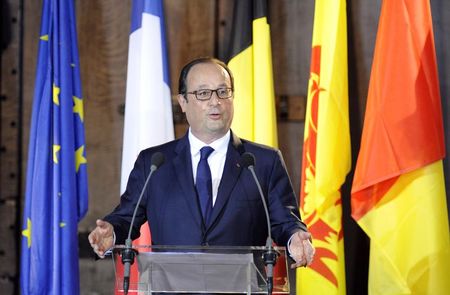By Ingrid Melander
PARIS (Reuters) - France's top officials are preparing the ground for another failure to meet fiscal targets, using weak growth and inflation to seek leniency from European partners.
The government has promised to come clean on the state of the economy after the publication of second quarter GDP data on Thursday, which are expected to register barely any growth.
Record-high jobless numbers, 16-year low housing starts and waning industrial output: most indicators already give a bleak image of the economy in the second quarter, with higher consumer spending a rare and insufficient bright spot.
Warning of tough economic times ahead, the government has broken away from a months-long "recovery-is-there" narrative to emphasise the difficulties, eyeing EU rules that allow the possibility of exemptions from targets if growth deteriorates.
Finance Minister Michel Sapin will "tell the French the truth, face reality without hiding anything" after the data is released, Prime Minister Manuel Valls said when asked if the time had come for the government to revise deficit targets.
While officials say the timing and detail of the announcement is still being discussed, economists are convinced this week's data will show France cannot meet its existing targets to bring its public deficit to 3.8 percent of GDP this year and down to the EU's cap of 3 percent of GDP in 2015.
"It's clear they will not meet the deficit target either in 2014 or 2015. We'll be quite far from it," said Societe Generale economist Yacine Rouimi. SocGen has a 3.4 percent public deficit forecast for France in 2015 while the government has so far stuck to its 3.0 percent projection.
A Reuters poll of 25 economists forecast the euro zone's second-largest economy eked out feeble 0.1 percent growth in the second quarter after stagnating in the first quarter, making the government's 1 percent growth forecast for the full year increasingly unlikely.
Data on Friday showed industrial output contracted by 0.5 percent over the quarter. A 1.0 percent quarterly increase in consumer spending, largely due to consumers turning up heaters because of worse-than-usual weather, will help but is unlikely to be enough to lift the economy out of its lull.
The last major unknown for second quarter GDP - stock variation - is volatile, Natixis Asset Management chief economist Philippe Waechter said, adding that it is possible the economy contracted.
Waechter expects 0.5-0.6 percent growth at most for the year and a public deficit above 4 percent of GDP this year and overshooting 3 percent next year.
Low inflation is further complicating the equation for the government in its drive to cut the debt and public deficit. Inflation figures due on Wednesday are forecast to show prices rose by just 0.6 percent year-on-year in July.
The government, which still benefits from record-low borrowing rates, had initially based its budget on a forecast of 1.4 percent inflation this year.
Last year, it revised its growth and deficit targets for both 2013 and 2014 when it published the draft 2014 budget bill in early September. Sapin has said he is waiting for Q2 GDP data before reviewing full-year growth.
SHOT IN THE FOOT
Second-quarter earnings for French firms showed weak activity, especially in the construction sector.
Europe's biggest construction and concessions company Vinci (PA:SGEF) warned it expected business to slow this year on the back of falling orders in its home market. Construction firm Eiffage (PA:FOUG) posted lower quarterly sales as revenue from public works dwindled.
Even before most June economic data and second-quarter earnings were known, economists polled by Reuters expected France's public deficit to stand at 3.9 percent of GDP this year and 3.3 percent in 2015.
Face with these difficulties, the only solution for France is to ask its EU peers for a further delay in targets after already getting a two-year reprieve, Natixis' Waechter said.
"Focusing on deficit reduction now, when private demand is depressed, would be like shooting oneself in the foot. Let's have a longer-term dynamic for public deficit reduction to avoid complicating the macro-economic situation further," he said.
The Socialist government has said it will stick to a 50-billion euro public spending cut plan for 2015-2017 but go no further, facing the difficult task of seeking to appease voters angry with high unemployment and EU partners upset with France's repeated failure to meet targets.
Over the past few weeks Valls and President Francois Hollande have repeatedly highlighted weak growth and low inflation, saying they would use the "flexibility" of the EU treaties.
Italy slid into recession for the third time since 2008 in the second quarter, data showed last week. The worsening outlook for some of its partners is both a cause for worry for France and a hope the argument that the economic environment is too bad to meet targets will hold sway.
"The government is in a judoka situation ... It must use the bad news that will come mid-August, use this difficult moment to get things to change at European level," said Stephane Rozes, head of Cap political analysts.
But Germany last week rebuffed French calls for it to do more to boost growth. And the most unpopular French president in modern history has his work cut out on the domestic front too.

A court last week struck down a reduction of the payroll tax paid by low-income workers, a measure which was key for the government to win approval from Socialists unhappy with deficit-cutting efforts. The government has pledged to find a replacement solution.
(Additional reporting by Natalie Huet, Yann Le Guernigou and Julien Ponthus; Editing by Andrew Callus/Mike Peacock)
